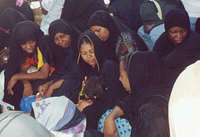Lamu was a haven for expats. Some had houses in town or in Shella but just spent a few months a year there. The few who lived full-time in Lamu formed a tight group and probably would never have gotten along back home.
First there was Carmen. I met her one day as I was trying to exchange a book at a stall on the waterfront.
“Lugha gani hii?” the fat woman who owned the stall asked me, suspiciously eyeing at my Isabel Allende novel. She was sitting on the table where her tattered books were displayed, passed down by anonymous travelers whom I suddenly felt closer to: they also had dealt with this woman.
“Ni KiSpanish. Ni kitabu kizuri sana,” I pleaded. I had read El Plan Infinito five times and no one wanted to buy it. Books in Italian, maybe, they all said, but hardly any Spanish people came to town.
“Quieres cambiar ese libro? Yo tengo un mont�n en mi casa.” The voice came from behind me; it was the first time I had heard Spanish since I left New York. I spun around to find a bent little woman beaming at me. I had seen her before, hobbling slowly down the main street, leaning on the arm of a young local man. We left the fat lady with her books and made our way to Bush Garden. After our third tea, we had exchanged the summaries of our lives. She had moved to Lamu almost ten years earlier.
“You see, I walk very badly. I couldn’t stand Madrid; I wanted a place without cars. So I came to Lamu.” She smiled sweetly, and I wondered how a woman of her generation had found the strength to leave the comfort and safety of the First World.
Carmen went to Bush Garden the same time every afternoon. I would find her sitting at the same table, her gray hair in the habitual bun, a book lying forgotten on her lap, watching the ocean. Sometimes she seemed melancholy; I don’t know if she thought about her family back in Spain, or her husband who had died years ago, or her younger days in Brazil and France. Her eyes would light up when she saw me. “Chinita!” she would exclaim, squinting through her glasses and giving me a kiss. She was “Mama Carmen” to the beach boys. She spoke bad English and very little Swahili, but everyone loved her.
Sometimes her best friend Inge would pass by on her way from or to the post office. She would read us letters from Germany and show us the seeds her sister had sent her. Inge had married a local. He died in a freak accident, leaving Inge to deal with his first wife’s demands for money. Inge stayed in Lamu, unable to re-enter European life after so many years in Africa. Carmen called her a saint, and I soon came to regard both of them that way. Inge always gave me fresh herbs from her garden and fresh towels from her washing machine (she knew how much I missed that clean smell); Carmen kept me supplied with Lorca, Garc�a M�rquez, and Sep�lveda.
|
![]()
One week, I was more busy than usual, making exams at the school and tutoring English and math to kids, so when the coach of the Super Stars invited me to watch the team play in Kizingitini that weekend, I considered it a little vacation. Kizingitini is a village on the island of Faza, several hours from Lamu. I found out quickly why my Lonely Planet guide didn’t mention it. After more than five hours on an inhumanely crowded boat, being spied at by women from behind their buibuis, I was more than ready to reach the island.
